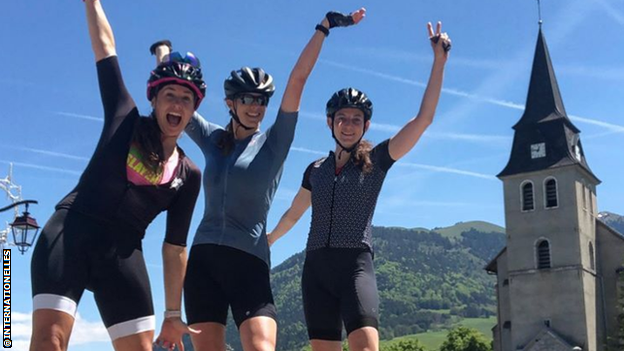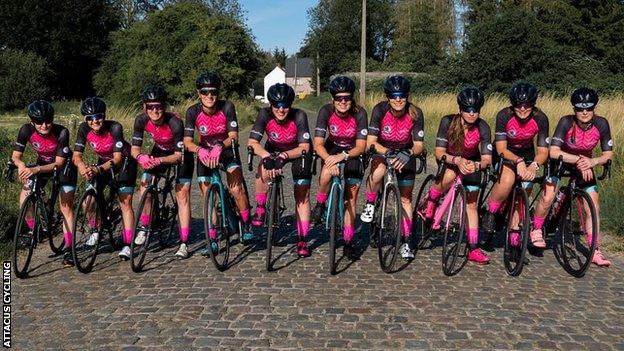Tour de France 2019: The growing number of female amateurs cycling for change
- Published
- comments

Many of us have suffered for our sport. The run in the rain, the extra rep in the gym, the emotional anguish of losing a tight contest.
But would you commit to three weeks of gruelling effort, with no trophy or financial prize on offer, to raise awareness about inequality?
How about taking on the Tour de France? One of the hardest events in any sport, an iconic carnival of suffering.
On Saturday, 176 men will start the 106th edition of the Tour in the Belgian city of Brussels, with stage wins, the famed jerseys, and overall glory on offer.
On Friday, 23 amateur female cyclists began the same 3,460km, 21-stage route, in the hope more people begin to ask: 'Why is there no women's Tour de France?'

Since 2015, a group of French riders, Donnons des elles au Velo (Give the girls a bike), have ridden each stage of the entire Tour a day before the men's race.
This year, for the first time, the 13-strong French outfit will be joined by a group of 10 riders from around the world - the InternationElles., external They will be riding a day before but a world away from the men's peloton.
"We are staying in Airbnb-type places so we can do our own cooking and washing," says Louise Gibson, one of five British-based riders in the team.
"We've been training like pros, but while also holding down jobs, and a couple of us are mums so it's all been quite a lot to manage."
The entire team only met for the first time on Thursday in Brussels, with three riders based in Australia, an American living in Switzerland and a Dutch cyclist completing the line-up.
They will now ride together, in traffic on open roads, over a notably mountainous route - this is the first time in Tour history that there will be three summit finishes at an altitude of more than 2,000m.

Louise Gibson (left), Sara Beck (centre) and Helen Sharp (right) training in the French mountains
Gibson is 41 and only started cycling five years ago after a succession of hip injuries forced her to give up running. "Day one will be the longest ride I've ever done," she says, aware that will still leave 3,448km to go. "It's a bit daunting to then have to bust out another 20 stages."
The storied climbs of the Alps and the Pyrenees that follow are the challenges she is most looking forward to and most fears. "I've done the Izoard (2,360m) before but then we've also got the Galibier (2,642m) on the same day," she adds.
"I've got all the gears I can on my bike so I'm going to get into my easiest gear and spin up. We're not racing, we're not trying to get a time. We're getting round as a team together and we'll do it - it just might be a bit painful at times."
This is not exactly a pure race then but a way of trying to prove that if amateur women can complete the route, their professional counterparts deserve a Grand Tour of their own in France.
Why put yourself through that pain in the hope of advancing the cause for others? Gibson says a "massive drive" for her was getting into cycling after watching the road races at London 2012, only to be "disappointed" by the subsequent lack of progress in the women's sport.
"We were all massively inspired by 2012 and getting to know all our athletes, then it all just went quiet," she says.
"I've spoken before with mates who think there aren't enough role models in women's cycling. But there are - there's people like Marianne Vos, Lizzie Deignan and Cecilie Uttrup Ludwig. We just don't hear about them or see them doing what they do.
"We're just trying to normalise cycling for little girls, and let them know it's something they can get into. They shouldn't be limited in their options by the fact they are female."
Gibson has two sons, aged 11 and eight. She says they both see women's sport as normal. It is when she tries to explain to them why female cyclists do not have the same opportunities that she "realises just how ridiculous things are".
She says: "It's that future generation that we are trying to help because change isn't going to happen in the next couple of years unfortunately.
"It would be lovely if we could say this is a one-off because next year it's going to be fixed but we know there is no way that is going to happen."

The InternationElles formed online after applying to join French team Donnons des elles au Velo
Progress can be slow in a sport so rooted in tradition.
Yet there was a women's Tour de France - the Tour de France Feminin - that ran alongside the men's race for five years from 1984. It faded through several missing editions and forced rebrands, before ending in the four-stage Grande Boucle in 2009.
Tour de France organisers Amaury Sport Organisation (ASO) run the one-day women's race, La Course. David Lappartient - the president of the UCI, cycling's world governing body - has urged them to extend it to 10 stages.
ASO says it is "logistically not possible" to operate a 10-day women's race during the men's Tour.
Can the InternationElles put pressure on ASO directly, or is it more about creating awareness that could translate to pressure from fans?
"It's both," says Gibson. "ASO is going to hear about us directly and they know about the French team, who are very careful to be onside with them. We're not being nuisances, we are doing this calmly and peacefully.
"It doesn't even need to be down to them - we're not saying we need ASO to put on a women's Tour de France, we just want an equivalent out there. If it's a new company, new sponsors, great."
Increasing sponsorship is key if women's cycling is to get more races, greater coverage and more stable teams. The men's sport faces plenty of financial challenges, with many teams vulnerable to ownership withdrawing backing and most riders on short contracts - issues that are exacerbated in the women's sport.
There are positive signs. A new 10-stage race in Scandinavia called the Battle of North is set to begin in August 2021, matching the length of the only women's Grand Tour, the Giro Rosa. Held in Italy, that race starts on Friday and suffers for running alongside the men's Tour de France. The Women's Tour in Britain also expanded to six stages this year, and achieved pay parity with the men's event.
A women's Tour de France along those lines would be a start. Gibson says: "It doesn't matter what time of year it is run, it doesn't need to be the full amount, there just needs to be the option of a multi-stage race in France at some point for women."
There may not be the backing required for even that yet but, by raising awareness, campaigns like InternationElles could help. Grow an audience and sponsors follow, sensing the opportunity.
As Gibson says: "The more they see it, the more they will want to see it."

BBC Sport has launched #ChangeTheGame this summer to showcase female athletes in a way they never have been before. Through more live women's sport available to watch across the BBC this summer, complemented by our journalism, we are aiming to turn up the volume on women's sport and alter perceptions. Find out more here.